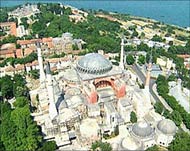Turkey: A bridge too far?
Ahead of a crucial October report on Turkey’s progress towards fulfilling European Union membership criteria, Prime Minister Recip Tayyip Erdogan went on a whirlwind tour of major European capitals earlier this month to promote his country’s case for joining.

The trip, taking Erdogan to Paris, Berlin and Rome, highlighted both the progress that Turkey has made in winning over some European sceptics, but also how far it still has to go.
The governments of all three countries voiced support for Turkey’s EU bid, with Italian Prime Minister Silvio Berlusconi going so far as to say that Turkey was “an example country in a region where democracy, which is one of the basic pillars of Europe’s defence system, does not exist”.
Others were not so warm.
Michael Glos, the head of the Christian Social Union in Germany’s parliament, said Ankara had little to bring to the EU.
“I don’t agree that Turkey’s membership will be in benefit of Germany because the EU can’t extend to the Caspian Sea,” said Glos, speaking after Erdogan’s visit on 10 September.
Erdogan’s Islamist Justice and Development Party (AKP) government has pinned its reputation on Turkey’s obtaining a date for the beginning of negotiations for accession to the European Union at the bloc’s December 2004 head of state summit.
To this end, the AKP, which holds a healthy two-thirds majority in the parliament, has railroaded through dozens of legislative and constitutional amendments designed to meet EU membership requirements.
These have included curbing the influence of the military in politics, boosting the rights of religious minorities, increasing penalties for human rights abuses, easing censorship and allowing broadcasting and education in Kurdish, long an issue with some EU member states.
Muslim partner?
 |
|
Some in Ankara believe Europe |
About 75% of Turks back the country’s attempt for EU membership.
But many doubt the goodwill of the 15-nation bloc, believing it is just paying lip service to Ankara’s aspirations and that it does not want a Muslim member in what is widely perceived as a Christian club.
It is a view reinforced by many in Europe itself.
Turkey and the EU would never make for comfortable bedfellows, said former French President Valery Giscard d’Estaing. He now heads up the committee drafting the European Convention.
“I do not think that attempts to make Turkey a member of the EU will have a result,” he told journalists in Strasbourg earlier this month.
Admitting Turkey to the EU would undermine hopes of developing a tight, homogenous structure among member states, said Giscard d’Estaing.
Instead, he believed there should be a relationship similar to the one enjoyed by the US and Mexico.
“I don’t believe that the Turkish people could easily digest accession to the EU. The legislative and social life in their country would completely change with accession. I am not sure how aware of that they are,” said Giscard d’Estaing.
Some in Turkey are very aware of the changes EU membership would entail, most critically the influential armed forces.
Though supporting the Westernisation of Turkey, the army is hostile to the EU’s demand that its role in Turkish political life – enshrined in the military drafted constitution of 1980 – be reduced.
Ceding power
With some ill grace, the military have allowed the powers of the National Security Council, which consisted of the heads of the armed services and the government’s senior ministers, to be watered down from being a policy-setting body to an advisory committee.
|
“I don’t believe that the Turkish people could easily digest accession to the EU. The legislative and social life in their country would completely change with accession. I am not sure how aware of that they are.” Valery Giscard d’Estaing, former French President |
Another factor in the generals’ opposition to the EU is their fear the government is strengthening human rights and freedom laws, not so much to meet the bloc’s membership requirements as to increase the influence of Islam in secular Turkey.
In a thinly veiled warning to the government, General Hursit Tolon, the commander of the Aegean Army, said the military would continue to monitor ‘anti-secular’ activities – a phrase aimed at the influence of Islamists in politics.
“Recently there have been some who have given intense support to or have protected these anti-secular circles,” he said. “The armed forces are closely watching these developments.”
He made the comments only days after the parliament approved a raft of legislation bringing more of Turkey’s laws into line with those of the EU.
In an event that typified Turkey’s EU vision, Prime Minister Erdogan’s son was married on 11 August, the bride a 17- year-old who wore a traditional Islamic headscarf along with her white wedding gown.
One of the two official witnesses for the marriage was Italy’s Berlusconi, who flew to Istanbul especially for the ceremony.
Full of European charm, Berlusconi went as far as to kiss the hand of his Turkish counterpart’s new daughter-in-law.
It is doubtful that Turkey’s marriage with the EU will take place as smoothly or with such grace.